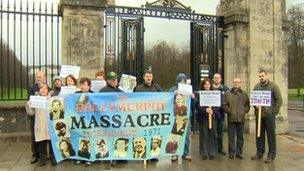Ballymurphy Army killings: Enda Kenny backs families' campaign
- Published

The Ballymurphy campaigners pictured during a previous protest at Stormont
The families of 11 people killed by the Army in Belfast more than 40 years ago have welcomed Irish Prime Minister Enda Kenny's support for their campaign.
They met him in Dublin on Thursday to ask for his help in setting up an independent investigation into the deaths of their loved ones.
The killings took place in Ballymurphy over a three-day period in August 1971.
A priest and a mother of eight were among the civilians shot dead by the Parachute Regiment.
Speaking after the meeting, John Teggart, whose father Daniel was among those killed, said: "This is a significant development in our campaign for the truth. There is still much work to be done. We need the Irish government to persuade the British government of the merits of this proposal.
"We want to thank the Taoiseach for meeting us today and for making the right decision."
Mr Kenny supported the families' call and said he would raise the matter with Prime Minister David Cameron at their next meeting.
Political representatives from Sinn Féin, the SDLP and the Alliance Party were also at the Dublin meeting.
Earlier this week, the group took the campaign for an independent investigation to Europe.
Last year, the families said they wanted former police ombudsman Nuala O'Loan to chair an independent panel. Its remit would include examining all documents and papers relating to the deaths.
The seven-strong panel would also include Prof Phil Scraton, author of the independent Hillsborough report into the deaths of 96 football fans in 1989, and civil rights lawyer Gareth Pierce.
The relatives said the panel should report within 12-18 months, and should be funded by the British and Irish governments.
Its work would reflect the terms of reference of the government-funded Hillsborough Independent Panel. The group also wants an apology from the government.
'Strong evidence'
In a statement released prior to Thursday's meeting in Dublin, the families said: "Over four decades we, the families of the deceased, have campaigned relentlessly and with dignity to establish publicly the context and circumstances in which our loved ones were killed.
"We have amassed strong evidence that all who died were killed unlawfully and in breach of Article 2 of the European Convention on Human Rights (ECHR).
"The case raises serious questions regarding human rights abuses committed by the British army and of a culture of impunity in the north of Ireland in which members of the security forces routinely were above the law."
The Ballymurphy shootings took place hours after the government introduced a policy of internment - the detention of paramilitary suspects without charge or trial.
The Parachute Regiment was involved in an operation in Ballymurphy to arrest people suspected of paramilitary activity.
The troops said they opened fire after they were shot at by republicans.
The priest, Fr Hugh Mullan, was shot as he went to the aid of a wounded man.
In June 2012, the former Northern Ireland secretary, Owen Paterson, turned down the campaigners' request for an inquiry.
The families said Mr Paterson told them it was "not in the public interest".
- Published27 January 2014
- Published10 July 2013
- Published11 February 2013
- Published9 October 2012
- Published20 June 2012